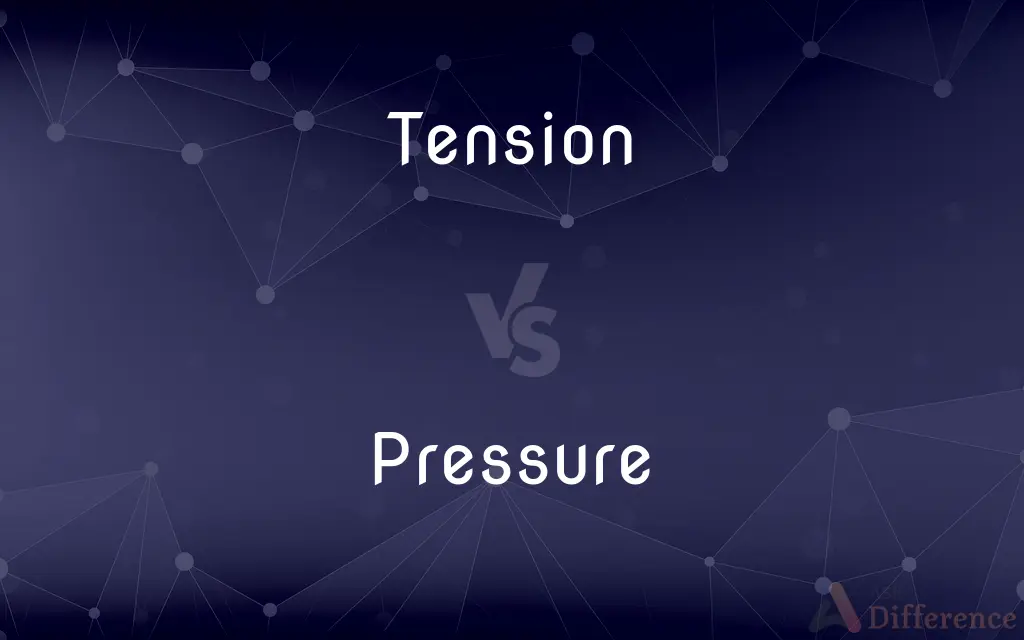Tension vs. Pressure — What's the Difference?
By Tayyaba Rehman & Fiza Rafique — Updated on April 1, 2024
Tension refers to the force that pulls materials apart, emphasizing stretching, while pressure denotes the force exerted over an area, highlighting compression.

Difference Between Tension and Pressure
Table of Contents
ADVERTISEMENT
Key Differences
Tension is a pulling force that acts to stretch or elongate an object, typically applied along the length of the material being stretched. Pressure, conversely, is defined as the force exerted per unit area on a surface, acting in a perpendicular direction to that surface.
While tension specifically refers to forces that attempt to pull something apart or extend it, pressure is concerned with forces that compress or push on a substance from all directions. This distinction means tension is directional and can be isolated in elements like ropes and cables, whereas pressure is omnidirectional, affecting fluids and solids in contact with other objects.
The measurement of tension is often in units of force, such as newtons (N), highlighting its nature as a vector quantity that has both magnitude and direction. Pressure, on the other hand, is measured in units of force per unit area, such as pascals (Pa) or pounds per square inch (psi), reflecting its distribution over a surface.
In practical applications, tension is crucial in the design and analysis of structures like bridges, where cables or tendons must withstand pulling forces. Pressure is a key factor in fields like fluid dynamics and engineering, where it influences the behavior of gases and liquids in pipelines, tanks, and atmospheric conditions.
Comparison Chart
Nature
Force pulling materials apart
Force exerted over an area
ADVERTISEMENT
Direction
Directional, acts along length
Omnidirectional, acts perpendicular to surface
Measurement
Units of force (e.g., newtons)
Units of force per unit area (e.g., pascals)
Applications
Structures requiring stretch resistance (e.g., cables, bridges)
Fluid dynamics, atmospheric conditions, engineering
Effect
Elongation or stretching of objects
Compression or squishing of materials
Compare with Definitions
Tension
Essential in structural engineering and physics.
Engineers calculate the tension in bridge cables to ensure stability.
Pressure
Central to fluid mechanics and various engineering applications.
Pressure differences drive the flow of fluids in pipes.
Tension
Can lead to elongation when applied.
The rubber band elongated significantly under tension.
Pressure
Results in compression or deformation of materials.
High pressure can compress gases into a smaller volume.
Tension
A pulling force that stretches materials.
The tension in the cable increases as the load does.
Pressure
Force distributed over an area.
The pressure at the bottom of a tank depends on the fluid's depth.
Tension
Measured in units of force like newtons.
The tension on the rope was measured at 500 newtons.
Pressure
Measured in pascals or pounds per square inch.
Atmospheric pressure is typically around 101,325 Pa.
Tension
Directional and affects the length of materials.
The beam experienced tension along its length under the load.
Pressure
Acts in a perpendicular direction to surfaces.
The pressure in a balloon acts on the inner surfaces uniformly.
Tension
The act or process of stretching something tight.
Pressure
Pressure (symbol: p or P) is the force applied perpendicular to the surface of an object per unit area over which that force is distributed. Gauge pressure (also spelled gage pressure) is the pressure relative to the ambient pressure.
Tension
The condition of so being stretched; tautness.
Pressure
Continuous physical force exerted on or against an object by something in contact with it
The gate was buckling under the pressure of the crowd outside
Tension
A force tending to stretch or elongate something.
Pressure
The use of persuasion or intimidation to make someone do something
Backbenchers put pressure on the government to provide safeguards
The many pressures on girls to worry about their looks
Tension
A measure of such a force
A tension on the cable of 50 pounds.
Pressure
Attempt to persuade or coerce (someone) into doing something
It might be possible to pressure him into resigning
She pressured her son to accept a job offer from the bank
Tension
Barely controlled hostility or a strained relationship between people or groups
The dangerous tension between opposing military powers.
Pressure
The act of pressing.
Tension
A balanced relation between strongly opposing elements
"the continuing, and essential, tension between two of the three branches of government, judicial and legislative" (Haynes Johnson).
Pressure
The condition of being pressed.
Tension
The interplay of conflicting elements in a piece of literature, especially a poem.
Pressure
The application of continuous force by one body on another that it is touching; compression.
Tension
A device for regulating tautness, especially a device that controls the tautness of thread on a sewing machine or loom.
Pressure
Abbr. P(Physics)Force applied over a surface, measured as force per unit area.
Tension
(Electricity) Voltage or potential; electromotive force.
Pressure
(Meteorology) Atmospheric pressure.
Tension
To subject to tension; tighten.
Pressure
A compelling or constraining influence, such as persuasion or negative attitudes, on the mind or will
Felt pressure to conform.
Peer-group pressure.
Tension
The condition of being held in a state between two or more forces, which are acting in opposition to each other.
Pressure
An influence acting as a source of distress or hardship
Economic pressures forcing people to work two jobs.
Tension
Psychological state of being tense.
Pressure
(Sports) Sustained, effective play that puts an opponent at a disadvantage
Defensive pressure forced the quarterback to throw interceptions.
Tension
A feeling of nervousness, excitement, or fear that is created in a movie, book, etc.; suspense.
Pressure
The condition of being subjected to physical, mental, social, or economic distress
Doesn't work well under pressure.
Tension
State of an elastic object which is stretched in a way which increases its length.
Pressure
A physical sensation produced by compression of a part of the body.
Tension
Force transmitted through a rope, string, cable, or similar object (used with prepositions on, in, or of, e.g., "The tension in the cable is 1000 N", to convey that the same magnitude of force applies to objects attached to both ends).
Pressure
(Archaic) A mark made by application of force or weight; an impression.
Tension
Voltage. Usually only the terms low tension, high tension, and extra-high tension, and the abbreviations LT, HT, and EHT are used. They are not precisely defined; LT is normally a few volts, HT a few hundreds of volts, and EHT thousands of volts.
Pressure
To force or try to force, as by influence or persuasion
The salesman pressured us to buy the car right away.
Tension
To place an object in tension, to pull or place strain on.
We tensioned the cable until it snapped.
Pressure
To pressurize.
Tension
The act of stretching or straining; the state of being stretched or strained to stiffness; the state of being bent strained; as, the tension of the muscles, tension of the larynx.
Pressure
To pressure-cook.
Tension
Fig.: Extreme strain of mind or excitement of feeling; intense effort.
Pressure
A pressing; a force applied to a surface.
Apply pressure to the wound to stop the bleeding.
Tension
The degree of stretching to which a wire, cord, piece of timber, or the like, is strained by drawing it in the direction of its length; strain.
Pressure
A contrasting force or impulse of any kind
The pressure of poverty; the pressure of taxes; the pressure of motives on the mind; the pressure of civilization.
Tension
The force by which a part is pulled when forming part of any system in equilibrium or in motion; as, the tension of a srting supporting a weight equals that weight.
Pressure
Distress.
She has felt pressure lately because her boss expects her to get the job done by the first.
Tension
A device for checking the delivery of the thread in a sewing machine, so as to give the stitch the required degree of tightness.
Pressure
Urgency
The pressure of business
Tension
Expansive force; the force with which the particles of a body, as a gas, tend to recede from each other and occupy a larger space; elastic force; elasticity; as, the tension of vapor; the tension of air.
Pressure
(obsolete) Impression; stamp; character impressed.
Tension
The quality in consequence of which an electric charge tends to discharge itself, as into the air by a spark, or to pass from a body of greater to one of less electrical potential. It varies as the quantity of electricity upon a given area.
Pressure
(physics) The amount of force that is applied over a given area divided by the size of this area; force per unit area.
Tension
Feelings of hostility that are not manifest;
He could sense her latent hostility to him
The diplomats' first concern was to reduce international tensions
Pressure
(transitive) To encourage or heavily exert force or influence.
Do not let anyone pressure you into buying something you do not want.
Tension
(psychology) a state of mental or emotional strain or suspense;
He suffered from fatigue and emotional tension
Stress is a vasoconstrictor
Pressure
The act of pressing, or the condition of being pressed; compression; a squeezing; a crushing; as, a pressure of the hand.
Tension
The physical condition of being stretched or strained;
It places great tension on the leg muscles
He could feel the tenseness of her body
Pressure
A contrasting force or impulse of any kind; as, the pressure of poverty; the pressure of taxes; the pressure of motives on the mind; the pressure of civilization.
Where the pressure of danger was not felt.
Tension
A balance between and interplay of opposing elements or tendencies (especially in art or literature);
There is a tension created between narrative time and movie time
There is a tension between these approaches to understanding history
Pressure
Affliction; distress; grievance.
My people's pressures are grievous.
In the midst of his great troubles and pressures.
Tension
(physics) a stress that produces an elongation of an elastic physical body;
The direction of maximum tension moves asymptotically toward the direction of the shear
Pressure
Urgency; as, the pressure of business.
Tension
The action of stretching something tight;
Tension holds the belt in the pulleys
Pressure
Impression; stamp; character impressed.
All saws of books, all forms, all pressures past.
Pressure
The action of a force against some obstacle or opposing force; a force in the nature of a thrust, distributed over a surface, often estimated with reference to the amount upon a unit's area.
Pressure
Electro-motive force.
Pressure
The force applied to a unit area of surface; measured in pascals (SI unit) or in dynes (cgs unit);
The compressed gas exerts an increased pressure
Pressure
A force that compels;
The public brought pressure to bear on the government
Pressure
The act of pressing; the exertion of pressure;
He gave the button a press
He used pressure to stop the bleeding
At the pressing of a button
Pressure
The state of urgently demanding notice or attention;
The press of business matters
Pressure
The somatic sensation of pressure;
The sensitivity of his skin to pressure and temperature was normal
Pressure
An oppressive condition of physical or mental or social or economic distress
Pressure
To cause to do through pressure or necessity, by physical, moral or intellectual means :
She forced him to take a job in the city
He squeezed her for information
Pressure
Exert pressure on someone through threats
Common Curiosities
How is pressure different from tension?
Pressure is the force exerted over a unit area on a surface, acting perpendicularly, while tension pulls materials apart.
What units are used to measure pressure?
Pressure is measured in units of force per unit area, like pascals (Pa) or pounds per square inch (psi).
How does tension affect materials?
Tension can cause materials to stretch, elongate, or even break, depending on their tensile strength.
In what units is tension measured?
Tension is measured in units of force, such as newtons (N).
Can tension and pressure coexist in the same system?
Yes, in many systems, both tension and pressure can be present and interact, such as in fluid-filled elastic membranes.
Where might one observe pressure in daily scenarios?
Pressure is observed in the inflation of tires, atmospheric pressure affecting weather, and the water pressure at different depths in a pool.
How do engineers use knowledge of tension and pressure?
Engineers use this knowledge to design structures and systems that can withstand these forces, ensuring stability and functionality.
Can the concept of tension be applied to fluids?
Tension is generally not applicable to fluids because they cannot withstand pulling forces without separating.
What defines tension in a physical context?
Tension is the force exerted along the length of an object, aiming to stretch or elongate it.
What effect does pressure have on substances?
Pressure can cause substances to compress, change phase, or deform, depending on the material and the amount of pressure applied.
What role does atmospheric pressure play in daily weather conditions?
Atmospheric pressure influences weather patterns and conditions, with changes indicating different weather phenomena.
What is an example of tension in everyday life?
A common example is the tension in a stretched rubber band or the cables of a suspension bridge.
Is tension considered a vector or scalar quantity?
Tension is considered a vector quantity because it has both magnitude and direction.
Why is pressure regarded as a scalar quantity?
Although pressure acts in a specific direction at a point, it is considered a scalar because it is defined without a specific direction when applied over an area.
How does water pressure vary with depth?
Water pressure increases with depth due to the weight of the overlying water, affecting divers, submerged objects, and marine life.
Share Your Discovery

Previous Comparison
Referral vs. Recommend
Next Comparison
Gals vs. GuysAuthor Spotlight
Written by
Tayyaba RehmanTayyaba Rehman is a distinguished writer, currently serving as a primary contributor to askdifference.com. As a researcher in semantics and etymology, Tayyaba's passion for the complexity of languages and their distinctions has found a perfect home on the platform. Tayyaba delves into the intricacies of language, distinguishing between commonly confused words and phrases, thereby providing clarity for readers worldwide.
Co-written by
Fiza RafiqueFiza Rafique is a skilled content writer at AskDifference.com, where she meticulously refines and enhances written pieces. Drawing from her vast editorial expertise, Fiza ensures clarity, accuracy, and precision in every article. Passionate about language, she continually seeks to elevate the quality of content for readers worldwide.
















































